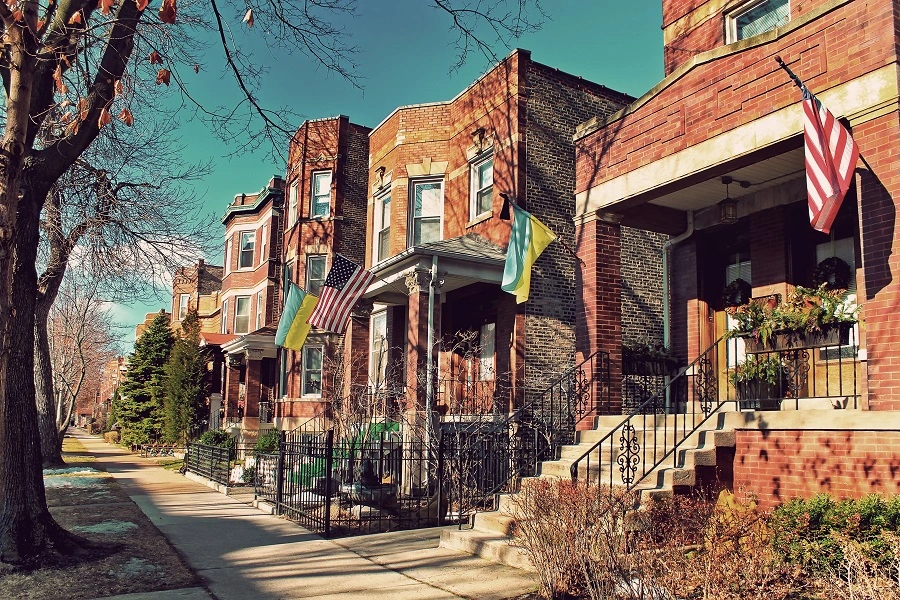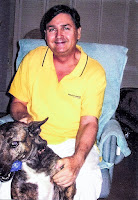Ukraine in my mind and heart
Ukraine should occupy no more space in my brain than Uzbekistan or Xinjiang but for the whims of fate, in particular my living in Chicago for 30 years, where I made some Ukrainian friends, and the Cuban diaspora after the communist takeover, including two close relatives who wound up in Ukraine.
Those connections now fuel my worries, and not a small amount of sadness, about what might befall Ukraine and its people, as the Russian eagle hovers above, ready to pounce and end that country's three decades years of independence. Tuesday night Russia invaded two eastern Ukraine provinces. Might that be a prelude to a wholesale Russian takeover?
My introduction to Ukraine began in 1972 when, fresh out of graduate school, I took a job at the then-U.S. Atomic Energy Commission's Argonne National Laboratory, southwest of Chicago. My job as an investigator of civil rights complaints had nothing to do with protons or hydrogen bombs, but led me to become friends with Maria Oharenko, a full-blooded Ukrainian, or Ukie as she sometimes called herself, who lived with her parents and brother John in Chicago's Ukrainian Village.
 |
| Ukrainian flags in Chicago |
Ukrainians began moving to Chicago sometime around the late 1800s, so their enclave is no Potemkin creation but an established ethnic community with restaurants, bakeries, museums and four churches, the newest being the Sts. Volodymyr and Olha Ukrainian Catholic Church, an imposing edifice that opened in 1971.
Churches here follow the Julian calendar, which marks Christmas on January 6 with an hours-long Ukrainian-language liturgy of candles, chanting, prayers and processions.
Maria's cooking skills, particularly her beet borscht and Ukrainian dumplings were formidable, as was her girth. For one Fourth of July concert she catered an al fresco gathering for a half-dozen friends at Chicago's lakefront Grant Park. A dainty wicker picnic basket hardly sufficed. So Maria wheeled in a Red Flyer wagon full of wine, cheeses and assorted Ukrainian delicacies. By the time the cannon blasts of the 1812 Overture and fireworks concluded the concert, all of Maria's friends were stuffed and ready to lie back and stare at the stars for an hour or two.
 |
| In Chicago's Ukrainian churches there's no such thing as too many icons or candles. |
Maria would not abide misunderstandings about Ukraine, and would issue firm corrections. It is not The Ukraine, she said, as if to designate a region within a larger country, like "the Midwest," but just Ukraine, its own country. Ukrainian and Russian languages may have a similar-looking Cyrillic alphabet but are as distinct as Spanish and Portuguese. Most important, Ukraine is not part of Russia, no more than Scotland is part of England, though both may share some common history and culture.
Those distinctions may sound trivial but are now crucial to understand Russian President Vladimir Putin, ominous words to President George W. Bush in 2008: "George, you have to understand that Ukraine is not even a country. Part of its territory is in Eastern Europe and the greater part was given to us.” According to Putin's take, Ukraine has no more claim to independent nationhood than Arkansas.
Maria left Chicago for Washington D.C. and then California and for a while I lost touch with her and things Ukrainian, until my second cousin Tatyana Stefanofska, who lives in Kyiv with her husband Yiriy, paid Stew and me a visit in Chicago in 2005, at the conclusion of a year-long Fulbright Fellowship at the University of California at Davis, doing research in biological control of pests.
 |
| Tatyana in Chicago in 2005 |
Roberto fell in love with his teacher Svitlana, and four years later had their only daughter, whose full-throated name, according to the Ukrainian patronimic rules, is Tatyana Robertivna Lanier. She later married Yiriy Stefanosvkiy and became Tatyana Robertivna Stefanovska, or Tanya for short. She is a professor of applied biology at the National University of Life and Environmental Sciences.
And just like my friend Maria in Chicago, Tatyana says her family's roots are all-Ukrainian, I suppose except for my cousin.
Separately, in 1972, my cousin Gustavo, travelled by ship with about 800 other young Cubans to the Black Sea port city of Odessa, also in Ukraine, to study naval engineering. By mad coincidence, another student aboard was Pablo, who was headed for Bulgaria, where he met and later married Gustavo's sister, my cousin Olga.
Gustavo's trajectory was far more tragic. He lived in Odessa until 1976 when he broke away from a group of Cuban students visiting Tokyo, went into the U.S. Embassy and asked for asylum. He was refused at first, until he threatened to jump off a sixth-story window if he was forced to return to Cuba, no doubt to face imprisonment. This bit of drama should have been an early sign of Gustavo's mental problems, but he was granted asylum in the U.S. anyway
From Japan, Gustavo went to California and then Miami, though the details of his travels are foggy because by this time he'd lost touch with his family. Years later, relatives in Miami found him at a halfway apartment for the mentally ill, living with a stray dog named Chance, which he had found on the beach and adopted as his closest friend.
 |
| Gustavo and Chance |
The winds of migration have scattered both sides of my family to Ukraine, Florida, Austin, Las Vegas, Mexico and another cousin to Chile who has since died. The family tree in Cuba is now barren, except for an Afro-Cuban branch, whom I discovered in 1998 while visiting the island. But that's another story, and by now they probably have fled too.
My connections with Ukraine and my relatives there survive and I keep in touch with Tatyana about the current situation. And so do the tragic memories of Gustavo and Chance, fraught though they may be by his illness.
In recent exchanges, Tatyana sounded optimistic about a peaceful resolution of the escalating confrontation between Ukraine and Russia. She speculated that Putin's saber-rattling was bluffing, to establish himself and Russia as a major world player, and that he would back off in the face of strong pressure by Western countries.
Her messages, two days before Russia launched its invasion of two of Ukraine provinces, have turned darker. She recognized that Putin might invade the two eastern Ukraine areas of Luhansk and Donetsk under the pretext of "protecting" Russian nationals living there, even if those claims would ring as hollow as Hitler's excuse in 1939, before World War II, for invading and annexing the Sudetenland area of Czechoslovakia to "protect" the German population there.
I have no idea what's in Putin's head. In an essay in today's New York Times, former Secretary of State Madeleine Albright describes him as "so cold as to be almost reptilian." (Though I've never met him, Putin rather reminds me of an opossum.) Either way, I doubt Putin will be satisfied with grabbing just a chunk of Ukraine, a country about the size of Texas.
The prospect of a defiantly democratic and independent Ukraine abutting the corrupt autocracy Russia has become under Putin, can't be a situation he would be happy with, as he tries to piece back together the former Soviet empire, whatever suffering that project might bring to human beings along the way.

Comments
Post a Comment
Let us hear your opinions, thoughts and comments